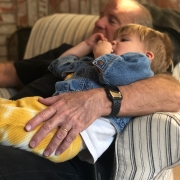Three Important Parenting Questions
As JoAnn and I began navigating the parenting waters, we found that, in the process of defining our values, we were also determining some basic rules for running the family ship “our way.” These were our first three basic questions:
- Is it safe?
- Will this create a habit?
- Does this make sense to me/us?
IS IT SAFE ? – This one’s pretty easy. Don’t touch wall sockets, don’t put dirty things in your mouth (parents – don’t leave them lying around), don’t touch the stove, don’t go out the back gate or the front door, etc. Children catch on pretty quickly to these, especially if you drop to a knee, use a “special” voice and look them in the eye when you tell them something is dangerous or a “no no.”
Doing our part as parents is important too. JoAnn and I put all of our dangerous or fragile things (chemicals, crystal, fancy knick-knacks) out of reach of our little children and generally “baby-proofed” our house (plugged our electrical sockets, put clips on drawers). Beyond that, with the exception of a gate at the stairs, we didn’t put padding on our coffee tables or alter our physical environment. Learning to navigate our house, edges and all, was also our children’s responsibility. The object for us was to teach them to be careful on their own, so that we wouldn’t have to spend our time monitoring their every move.
WILL THIS CREATE A HABIT? – This one’s a little tougher. It’s more about our behavior than that of our children.
 Everything we do as parents can become an expectation on the part of our children. If we leave their light on for two nights, they’ll expect the light to be left on forever. If we let them sleep in our bed for two nights in a row, then you can be sure that they’ll want to toddle their way into the bedroom on nights three, four, and forever. It’s especially important in this instance to weigh your glorious pleasure — at having this wonderful, warm, sleeping angel next to you — against the fact that it’s not going to be particularly wonderful to have your kids wanting to join you in bed whenever they want.
Everything we do as parents can become an expectation on the part of our children. If we leave their light on for two nights, they’ll expect the light to be left on forever. If we let them sleep in our bed for two nights in a row, then you can be sure that they’ll want to toddle their way into the bedroom on nights three, four, and forever. It’s especially important in this instance to weigh your glorious pleasure — at having this wonderful, warm, sleeping angel next to you — against the fact that it’s not going to be particularly wonderful to have your kids wanting to join you in bed whenever they want.
I know there is a movement today toward “Attachment Parenting” — but, seriously, from my male point of view, this is a biggie. I consider our bed to be a private place for my wife and me, a refuge for the original relationship that led to having those wonderful, but not-in-my-bed, children. There are many differing opinions on this issue, and it’s really up to you and your spouse to determine how you plan to deal with this. In my case, I am rarely happy when one of my children is not only taking up my space in bed, but also distracting JoAnn from her original bedmate – ME. That’s why our children have their own beds.
DOES THIS MAKE SENSE TO ME / US ? JoAnn and I will usually have decided whether or not it’s alright for our kid to play in a puddle, eat a dog biscuit, or bang the kitchen pans. Everybody makes their own decisions about these sorts of things. You’ll probably think that some of your friends are crazy, but whether they let the dog lick their baby’s mouth is entirely up to them. What happens in your house is entirely up to you.
I grew up in a house where there were a lot of odd “rules” – which, I suppose made sense to my parents. One of them was Eating Everything On Your Plate, another was Making Your Bed, another was No Sugared Cereals, and finally, No Soft Drinks.
These rules, especially cleaning one’s plate, filled every meal with a serving of potential conflict, which usually overshadowed anything pleasurable that might have happened at the dinner table. JoAnn and I are quite structured in our parenting, which some might regard as “strict,” but we tried to avoid setting up arguments about things that were relatively unimportant (compared to proper manners), which left plenty of room for fun, and a feeling of safety in our house. Remember how you felt as a kid. My childhood dinners were a battlefield. We agreed to avoid that.
 Peace at home starts with not creating things to argue about. If our children didn’t make their beds, they returned to their own messy rooms. If they didn’t eat everything on their plates and they got hungry later, it was their problem to feed themselves. We continue to teach them to avoid worrying about things we can’t control (like other people’s behavior, telephone lines near the house, and World Peace), and we try not to bring the fears of the world into our home (like discussing money problems or serious health issues in front of our children).
Peace at home starts with not creating things to argue about. If our children didn’t make their beds, they returned to their own messy rooms. If they didn’t eat everything on their plates and they got hungry later, it was their problem to feed themselves. We continue to teach them to avoid worrying about things we can’t control (like other people’s behavior, telephone lines near the house, and World Peace), and we try not to bring the fears of the world into our home (like discussing money problems or serious health issues in front of our children).
But that’s just us, and that’s what we agreed to in our plan.
It’s not hard to implement this simple three point checklist, and I hope it can be helpful in helping you set up your own expectations and family goals. Most of this comes down to common sense – so don’t let the heat of the moment throw your thinking off. Stay true to your adult hunches, it will make your life much easier.



I’m with you with the children not-in-my-bed thing. This will also teach them to respect people’s privacy.